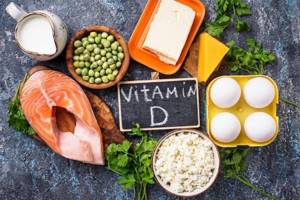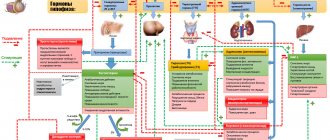Effect on weight gain
Endocrinologists say that this substance is essentially a hormone, not a vitamin. Receptors for it are located in the kidneys, pancreas, and in the cells of the nervous and immune systems. Therefore, the component is so important for all processes occurring in the body. Including for weight loss.
Research on how vitamin affects weight gain or loss began not so long ago. However, experts have already found out that when there is a lack of substance, cells do not receive a signal from receptors to burn fat. If there is enough of it in the tissues, weight loss occurs more effectively.
A study of more than 4,600 older women found that higher vitamin D levels were associated with less weight gain between doctor visits over the course of a 4.5-year study. ()
Hypervitaminosis
An excess of calciferol is less common than its deficiency, but causes a number of serious consequences:
1. Calcification of tissues, its deposition in bones, blood vessels and internal organs. 2. Gross changes in metabolic processes with damage to the kidneys, heart, and lungs. 3. Convulsive phenomena, severe muscle spasm.
The disease manifests itself especially clearly in young children: their overall development slows down, there is a decrease in growth rates, low weight, and decreased motor functions.
Symptoms of hypervitaminosis are often caused by uncontrolled excess of the concentration of medicinal drugs during the treatment of vitamin D deficiency.
Also, the development of an excess of this vitamin in the body is possible with a combination of taking large doses of fish oil and prolonged exposure to the sun.
Obesity is a risk factor for vitamin D deficiency
A large number of statistics indicate that overweight people are almost always diagnosed with vitamin D deficiency in their blood serum. Scientists suggest that this happens for several reasons:
- the diet of overweight people usually consists of unhealthy foods that are extremely low in vitamin D;
- Overweight people in warm weather do not really like to expose their bodies in the sun, feeling complex about their proportions, thus depriving themselves of the main source of a vitamin so important for health;
- The level of consumption of nutrients directly depends on body weight: the larger it is, the more the body needs a particular vitamin or microelement. That is, overweight people automatically have a higher daily vitamin D requirement than people with normal body weight.
Overweight people have higher daily intakes of vitamin D3 than people with a normal body index. At the same time, the chances of getting such an important vitamin from food or exposure to the sun are much less. This is the vicious circle: you need to consume more than everyone else, but you get much less. ()
At the same time, scientists have found that in the process of losing weight, the daily dosage should be reduced, since a lower concentration will be enough to maintain the required level in the blood.
Getting enough vitamin D can improve weight loss, reduce body fat, and limit weight gain
Dosage for the prevention and treatment of obesity
A few years ago, experts believed that the prophylactic dose of the component should be 400-600 IU per day for an adult. However, recent data suggests that this is not enough.
Most people on the planet suffer from vitamin deficiency to one degree or another. And a dosage of less than 1000 IU per day is not able to correct the situation. Most often, even this amount is not enough to solve existing problems.
Now scientists in most countries have come to the conclusion that the preventive dose of the vitamin should be 2000 IU per day. If we are talking about a therapeutic dosage, then it can reach 5,000 or even 10,000 IU per day. The exact amount must be determined by the attending physician based on the test results, as well as the weight and age of the patient.
You should not take high doses of the drug on your own. The fact is that the supplement can be harmful if the patient experiences an overdose. In this case, conditions associated with excess calcium may develop. When the concentration of the substance increases, it is possible to remove salts from the body.
Vitamin D is a unique element, the lack of which leads to health problems in various areas. This component affects the processes of weight gain and loss. Therefore, those who want to lose weight should get tested to determine the level of the substance. By making up for the deficiency, burning extra pounds will be more efficient.
How does it help you lose weight?
Since receptors for the component are also present in brain cells, it affects feelings of satiety and hunger. In patients who are deficient, the signal of saturation is too weak. As a result, the feeling of hunger does not go away even after eating a large amount. The patient constantly overeats, as a result of which he gains extra pounds.
In addition, vitamin D promotes weight loss indirectly. With its deficiency, people experience increased fatigue, lack of energy and strength, lethargy and apathy. The mood worsens, irritability and aggression appear. This condition leads to the fact that the patient seeks to compensate for the lack of positive emotions with the help of food (most often harmful). ()
If the level of the substance in the body increases, vigor appears, and the person strives for activity. Increasing your mobility helps you burn calories more effectively and lose weight.
Vitamin D increases levels of serotonin, a neurotransmitter that affects everything from mood to sleep regulation. ()
Scientists were also able to determine that a lack of a component leads to disruption of hormone production in both men and women. Deficiency causes a decrease in testosterone and estradiol levels. () Lack of hormones leads to the fact that patients begin to quickly gain extra pounds, even if they have not changed their diet, and lead an active lifestyle.
Vitamin D promotes weight loss by changing the storage and formation of fat cells and increasing serotonin and testosterone levels.
Researchers suggest that the heavier a person is, the worse vitamin D is absorbed. According to the main version, the fat-soluble substance is captured by fat cells. This leads to a decrease in bioavailability, as well as a slowdown in metabolic processes.
The second assumption is that, against the background of a deficiency of the component, calcium deficiency also occurs. Because of this, the production of enzymes that form fatty acids is stimulated. As a result, patients with vitamin deficiency begin to gain weight faster.
Possible harm
Incorrect, chaotic and unsystematic use of such drugs can cause damage to health instead of the expected positive result. This can lead to a complete loss of appetite with the emergence of a deficiency of nutrients and the onset of irreversible destructive processes in cells and tissues.
Vitamin D for weight loss (reviews from those who took it confirm this) causes allergic reactions if there is a congenital predisposition to them.
Increased physiological activity of fat-soluble compounds can provoke:
- myalgia;
- abdominal pain;
- migraine attacks;
- aching joints;
- discomfort in the tendons.
Women who abuse vitamin D experience hysterical manifestations, sudden mood swings, and depressive states. Although in therapeutically appropriate and individually calculated doses, such drugs act exactly the opposite.
Renal dysfunction has been reported with intensive use of calciferols.
Other side effects include:
- arterial hypertension;
- increased intracranial pressure;
- cardiac arrhythmia;
- rapid pulse;
- increased sweating;
- hypercalcemia - an increase in the concentration of calcium in the plasma fraction of the blood;
- pathological content of calcium salts in uric acid.
Excessive intake of vitamins D causes defecation disorders, increases gas formation in the gastrointestinal tract, and disrupts digestive functions.
Arthralgic syndrome associated with the consumption of fat-soluble substances in this category is especially frequently reported. This disorder is characterized by spontaneous pain of a volatile nature in the articular joints in the absence of other concomitant arthritic symptoms. Regular excess of the recommended norm of vitamins D leads to the accumulation of calciferols in the intestinal lumen and tissues of internal organs.
In addition to specific symptoms, this is manifested by typical signs of drug intoxication:
- nauseating urges;
- activation of the gag reflex;
- uncontrolled muscle contractions;
- dizziness;
- strong thirst;
- drying of the mucous membranes of the eyes and mouth;
- general weakness;
- increased nervous excitability;
- hyperthermia;
- feeling of constant fatigue.
Uncontrolled use of medications containing vitamin D can cause significant harm to the body instead of the desired effect of losing weight and stabilizing metabolic processes.
Impact on endurance
A 2021 study found that combining vitamin D with aerobic and resistance training may result in greater calorie loss than exercise alone, without supplemental vitamin D3.
In addition to the benefits of exercise, the body stores vitamin D and allows it to play an important role in muscle recovery. Muscle tissue has specific vitamin D receptors that help the nutrient strengthen muscle fibers and promote recovery from cell damage.
For example, since the heart is a muscle, the organ also has specific receptors for vitamin D. A study published in the Circulation Journal found that people with low vitamin D levels are significantly more likely to develop cardiovascular disease. Therefore, taking vitamin D for weight loss may also help lower levels of heart disease risk markers.
Vitamin D may also inhibit the accumulation of scar tissue and fibroblasts after cardiac injury. That is, it makes cardio workouts more effective and benefits cardiovascular health.
Because there is an inverse relationship between internal vitamin D levels and mood swings, vitamin D deficiency can lead to muscle fatigue.
According to research, supplementing with this essential nutrient may improve endurance during exercise. This nutrient is also important for converting the amino acid tryptophan into serotonin, a hormone largely associated with elevated mood and more energy.
Serotonin may also reduce occasional uncontrollable hunger and increase feelings of fullness after eating
Additionally, vitamin D can also help improve sleep and lead to better rest after exercise.
Release form, comparison
All representatives of the pharmacological category of calciferols have their own characteristics of physiological effects on the body in general and on weight loss in particular. They are included in highly specialized medications and vitamin complexes with a wide range of effects.
The dosage forms of such drugs are varied and numerous. Each of them has its own set of advantages and disadvantages. Vitamin D is also produced in the form of separate therapeutic and prophylactic agents, where it is the only active ingredient.
In pharmacies you can find calciferol-based:
- oral drops;
- alcohol tinctures;
- oil solutions;
- pills;
- bioactive food additives;
- injectable drugs;
- sweet syrups for children;
- vitamin pills;
- enteric capsules.
Single preparations of vitamin D and its combinations with other pharmacologically active substances are popular. There are complex weight loss medications on sale that combine cholecalciferol with calcium carbonate.
Such medications not only promote weight loss, but also strengthen skeletal bones, teeth, and nails. The active form of vitamin D3, alpha-calcidol, is combined with calcium carbonate in dietary supplements.
Dosage form: powder or water-soluble granules. The nutritional supplement allows you to correct your figure. It is useful for patients with osteomalacia and osteopathic disorder.
Calciferol in combined action tablets may additionally contain:
- magnesium oxide, which reduces the acidity of gastric juice;
- zinc dioxide having adsorbing properties;
- pharmacologically active form of copper;
- manganese sulfate, which has antiseptic and anti-inflammatory properties;
- Sodium tetraborate is a fungicidal and bacteriostatic substance.
In food supplements and pharmacological preparations, the most popular are 2 forms of vitamin D, which demonstrate good fat-burning abilities - ergo- and cholecalciferol.
Their chemical structure differs only in the structure of the side molecular chain. Vitamin D2 (ergocalciferol) is synthesized by ultraviolet irradiation of ergosterol, secreted by certain types of yeast. Its fat-burning properties have been scientifically proven.
Vitamin D for weight loss in the form of cholecalciferol has collected reviews in large quantities. In them, patients note the rapid onset of the desired clinical effect.
This fat-soluble substance is obtained by exposing lanolin 7-dehydrocholesterol to ultraviolet light and further biochemical conversion of the resulting cholesterol.
Comparative table of dosage forms of vitamin D:
| Type of drug | Properties and Features |
| Oral tablets | A firmly pressed medicine with a clearly dosed content of a pharmacologically active substance - calciferol or its derivative. A standard tablet contains 200 IU of the active ingredient. |
| Solution | Liquid dosage form, water or oil based. It can be drunk or injected. The first is relatively safe to use, easy to digest and allows you to accurately calculate the required dosage by the number of drops. The oil base significantly impairs absorption and systemic clearance. |
| Enteric capsules | Miniature gelatin flask containing liquid or powder. Slippery coating makes it easy to swallow. One standard weight loss capsule contains 600 IU of vitamin D. |
| Paste | The medicine is in the form of a candy with a jelly-like consistency. It has a pleasant aroma and fruity taste. It is important not to abuse this drug so as not to cause intoxication and side effects. |
| Spray | Vitamin aerosol with dispenser. Suitable for patients who have difficulty swallowing medications. |

Injection solutions with calciferol are not used for weight loss. In clinical practice, they are used mainly for acute and urgent pathological conditions - malabsorption syndrome, hypocalcemic tetany, etc.
Official studies
In the last decade, scientists have been actively studying how the substance affects the processes of weight gain and loss. The researchers concluded that deficiency increases not only the risk of obesity, but also the likelihood of developing diabetes.
Brazil
One study on this topic was conducted in Brazil. His results confirmed that the deficiency of the component is 24% higher in patients who are overweight, and also 35% higher in obese individuals.
Another experiment was conducted in Iran, where they made a random sample of women suffering from extra pounds. The subjects were divided into two groups. The first received vitamin D, the second received placebo. Patients who took these supplements experienced a decrease in body weight and a simultaneous increase in the concentration of the substance after 3 months.
Milan
The following study was carried out by scientists from the University of Milan. The experiment involved 400 volunteers from the northern regions of Italy. All of them suffered either from excess weight or from obvious obesity. The patients were divided into 3 groups. The first one was not given any supplements. The second received a prophylactic dose of the vitamin, the third received a therapeutic dose.
All subjects were switched to a balanced diet. After the end of the experiment, which lasted for six months, it turned out that the patients who did not receive supplements had virtually no change in weight. In subjects from the second group, waist circumference decreased by an average of 4 cm. In patients from the third group, who received the highest dose of the substance, the waist decreased by an average of 5.5 cm. ()
USA
In Seattle, researchers gathered mature women suffering from extra pounds and lack of a component. Among those who received supplements to increase vitamin levels, the rate and quality of weight loss were more effective.
The University of Minnesota also confirmed that increasing the level of vitamin D in the body leads to an acceleration of metabolism. As a result of improved metabolism, fat burning occurs faster and the results last longer.
The following experiments were aimed not only at linking substance deficiency and excess weight. Scientists also paid attention to the levels of sugar and insulin in the blood of the experiment participants. As it turned out, patients with elevated levels of components in the blood do not lose weight. Vitamin D normalizes these indicators, which triggers fat burning processes and also reduces the risk of developing diabetes.
Asia
A similar study was carried out by specialists from several Asian countries. It was attended by residents suffering from overweight and obesity. Scientists have determined that a deficiency of the component leads to increased insulin resistance. As a result, the body gains extra pounds faster and has a harder time losing them.
Deficiency Symptoms
Since excess weight does not always indicate a deficiency of a substance, it is necessary to further determine its level. This can be done using a routine blood test. When the level is less than 20-25 ng/ml, we can talk about a deficiency of the component. However, a deficiency can also be determined based on several common symptoms:
- increased bone fragility;
- painful sensations in the joints, muscle weakness, cramps;
- splitting, dullness, brittleness of nails;
- mood swings, irritability, aggression, tendency to depression and stress;
- sleep disorders;
- decreased immunity, frequent colds accompanied by complications;
- dental problems, caries;
- deterioration or, on the contrary, increase in appetite;
- constant fatigue, weakness, lack of strength and energy;
- often there is a feeling of anxiety, memory and attentiveness deteriorate;
- problems with the menstrual cycle in women;
- sweating of the palms, as well as itchy skin.
Vitamin D overdose and contraindications
Possible side effects of taking vitamin D include decreased appetite, allergic reactions, mood swings, renal dysfunction, myalgia, and increased blood pressure.
Excessive long-term use can provoke the development of poisoning. Symptoms: vomiting, nausea (read other causes of nausea on the website), headache, joint pain, fatigue, weakness, extreme thirst.
Thus, vitamin D is an extremely important compound for the body. Reasonable use of the drug will not only avoid a number of serious diseases, but also simply keep the body in good shape and get rid of extra pounds.











